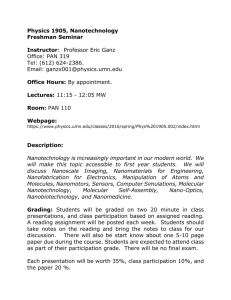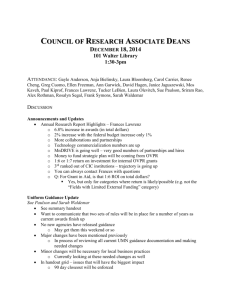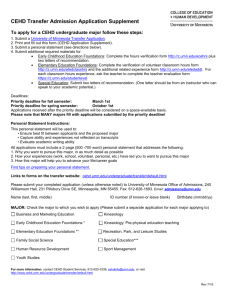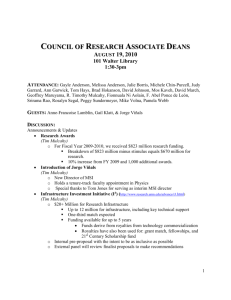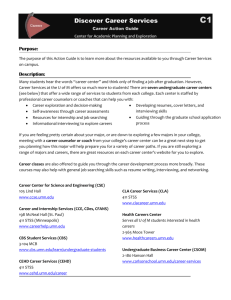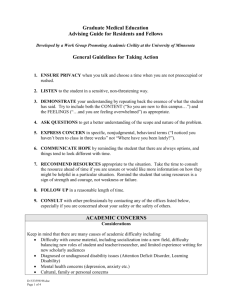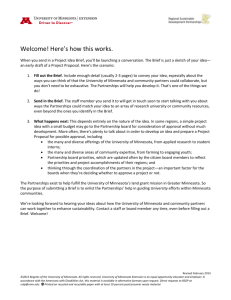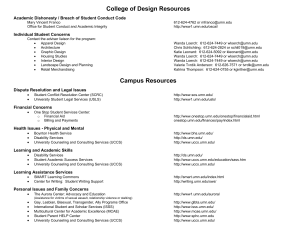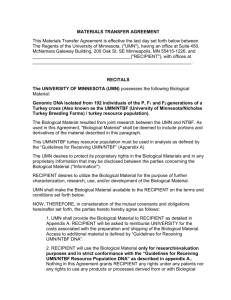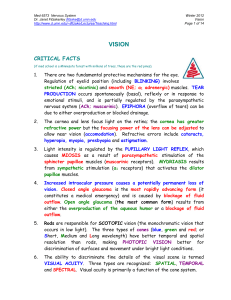Student Mental Health: The Role of Faculty and Staff
advertisement
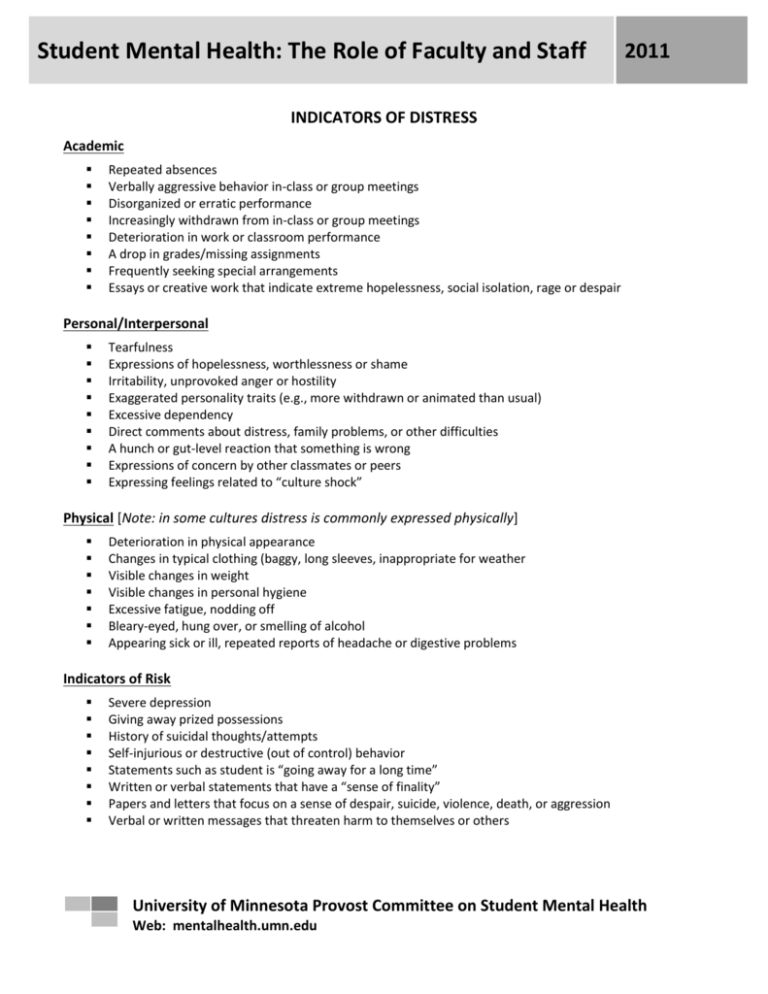
Student Mental Health: The Role of Faculty and Staff 2011 INDICATORS OF DISTRESS Academic Repeated absences Verbally aggressive behavior in-class or group meetings Disorganized or erratic performance Increasingly withdrawn from in-class or group meetings Deterioration in work or classroom performance A drop in grades/missing assignments Frequently seeking special arrangements Essays or creative work that indicate extreme hopelessness, social isolation, rage or despair Personal/Interpersonal Tearfulness Expressions of hopelessness, worthlessness or shame Irritability, unprovoked anger or hostility Exaggerated personality traits (e.g., more withdrawn or animated than usual) Excessive dependency Direct comments about distress, family problems, or other difficulties A hunch or gut-level reaction that something is wrong Expressions of concern by other classmates or peers Expressing feelings related to “culture shock” Physical [Note: in some cultures distress is commonly expressed physically] Deterioration in physical appearance Changes in typical clothing (baggy, long sleeves, inappropriate for weather Visible changes in weight Visible changes in personal hygiene Excessive fatigue, nodding off Bleary-eyed, hung over, or smelling of alcohol Appearing sick or ill, repeated reports of headache or digestive problems Indicators of Risk Severe depression Giving away prized possessions History of suicidal thoughts/attempts Self-injurious or destructive (out of control) behavior Statements such as student is “going away for a long time” Written or verbal statements that have a “sense of finality” Papers and letters that focus on a sense of despair, suicide, violence, death, or aggression Verbal or written messages that threaten harm to themselves or others University of Minnesota Provost Committee on Student Mental Health Web: mentalhealth.umn.edu Student Mental Health: The Role of Faculty and Staff 2011 PROCESS FOR TALKING WITH STUDENTS Observe and Prepare Write down specific concerns and referral sources Gather information and have it on hand (www.mentalhealth.umn.edu) Consult with a counseling professional to help you prepare if necessary. Approach the Student Approach in convenient and appropriate time. Choose a private and confidential setting. Use calm, non-threatening, approachable manner that demonstrates concerns (it can help to smile). Express Your Concerns Share concerns in honest, behavioral terms to increase understanding (e.g., “I’ve noticed you’ve missed several classes and haven’t turned in two assignments and I’m concerned about this” not “You are disinterested and unmotivated and this needs to change”). Resist Interpretation and judgment about student behavior, stay focused on the concerning behavior. Expect the student to understand and be motivated by your concern. Listen Tune into the details of the situation, clarifying as needed: ▫ What information is the student sharing that you were unaware of? ▫ What is the reason they are doing what they are doing? ▫ What are the feelings? Acknowledge them. ▫ What does the situation mean to them? How does it affect how the student sees him- or herself? Try to stay calm even if the student is not. Don’t promise absolute confidentiality. You can assure the student you will respect privacy and only share information if it is necessary (e.g., for the student’s safety). Work Together Given what you have discussed what would improve the situation? What are the options at this moment in time? Do not overextend yourself or give immediate special attention. Intervene if necessary. Make a referral. Communicating hope in whatever the plan is can help motivation. Communicate there is shared responsibility for solving the problem. Find out if they can talk with friends or family or if they would be willing to see a counselor. Assure them this is common and confidential (decrease stigma about seeking services). Follow Through Follow through with anything you agreed to (promises you can and will keep). Recognize that the student may not immediately welcome or act on your intervention. Consult with your administrator or counseling services if the problem persists. University of Minnesota Provost Committee on Student Mental Health Web: mentalhealth.umn.edu Student Mental Health: The Role of Faculty and Staff 2011 CONSIDERATIONS WHEN WORKING WITH INTERNATIONAL STUDENTS International Students and Mental Health, Important Factors Academic difficulties (different academic system, own expectations about performance, etc.) Cultural adjustment and misunderstandings Financial difficulties (which can affect academic and immigration status) Parental expectations Stigma around asking for help Support (family far away, difficult to make friends) International Students Basic Immigration Requirements Must maintain a full course of study or will lose their visa status without an approved ISSS exception form. Must maintain good academic standing and make academic progress. Have a limited time to complete their degree. Have limits on employment - generally only part time, on campus allowed without special permission from ISSS. There are limited options for family members. Tips for Working with International Students Smile--warmth and friendliness mean a lot. Provide context: Explain your role compared to others. Explain why you are asking questions or giving info that may seem unrelated to them. Give your business card, explain when/why to contact you or return. Be aware that assumptions about your role, relationship, how to get things done, etc., might be different. Slow down, pause, rephrase if language difficulties, be patient. Avoid or explain idioms, jargon, slang and culturally bound references. Point to information on maps, schedules or program descriptions. Summarize main points and next step. Write it down. Learn from your international colleagues. University of Minnesota Provost Committee on Student Mental Health Web: mentalhealth.umn.edu Student Mental Health: The Role of Faculty and Staff 2011 WORKING WITH DISABILITY SERVICES Disability Services partners with the University community to ensure that students, employees and guests with disabilities receive equal access to University classes, programs, services, facilities and employment. Disability Services Recommended Class Syllabus Statement The University of Minnesota is committed to providing all students equal access to learning opportunities. Disability Services (DS) is the campus office that works with students who have disabilities to provide and/or arrange reasonable accommodations. Students who have, or think they may have, a disability (e.g. mental health, attentional, learning, vision, hearing, physical or systemic), are invited to contact DS to arrange a confidential discussion at 612- 6261333 (V/TTY) or ds@umn.edu. Students registered with DS, who have a letter requesting accommodations, are encouraged to contact the instructor early in the semester to discuss accommodations outlined in their letter. Additional information is available at the DS website http://ds.umn.edu Mental Health Services Syllabus Statement As a student you may experience a range of issues that can cause barriers to learning, such as strained relationships, increased anxiety, alcohol/drug problems, feeling down, difficulty concentrating and/or lack of motivation. These mental health concerns or stressful events may lead to diminished academic performance or reduce a student’s ability to participate in daily activities. University of Minnesota services are available to assist you with addressing these and other concerns you may be experiencing. You can learn more about the broad range of confidential mental health services available on campus via www.mentalhealth.umn.edu. Developed and endorsed by the Provost Committee on Student Mental Health, June 2006 Recommended by the Senate Committee on Educational Policy, June 2009 Contact Information University Counseling and Consulting Services (UCSCS) Boynton Mental Health Clinic Disability Services International Student and Scholar Services (ISSS) 340 Appleby Hall Boynton Health Services 410 Church Street S.E. Suite 180 McNamara Alumni Center 190 Humphrey Center Phone: 612-624-1444 Website: bhs.umn.edu/east-bankclinic/mental-healthservices.htm Phone: 612-626-1333 (voice or TTY) E-mail: ds@umn.edu Website:ds.umn.edu Phone: 612-624-3323 Website: uccs.umn.edu Phone: 612-626-7100 E-mail: isss@umn.edu Website: isss.umn.edu University of Minnesota Provost Committee on Student Mental Health Web: mentalhealth.umn.edu
